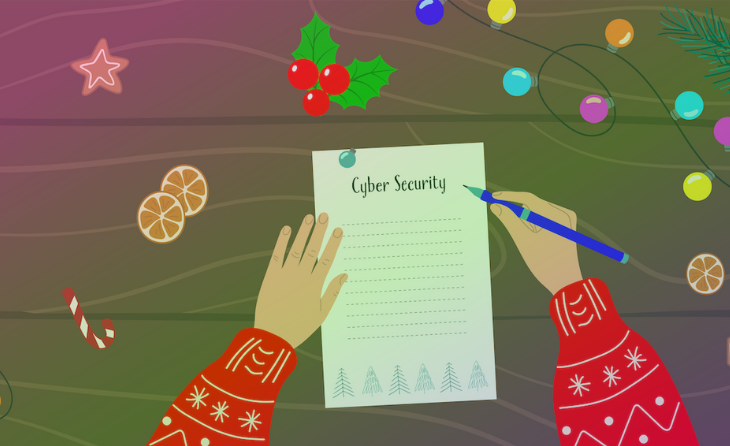
As the festive season approaches, it’s not just your personal shopping list that needs attention — your organisation’s cyber security strategy should be a top priority too.
While most of us prepare to wind down and relax, cyber criminals are gearing up, knowing that this is the perfect time to strike. The festive period often creates an ideal environment for cyber attacks and more often than not, organisations are especially vulnerable.
This is because many organisations operate with reduced staff during this time, leaving crucial IT teams understaffed or unavailable. This slower response time creates an opportunity for cyber criminals to make their move. The risks — ranging from ransomware attacks to phishing scams — are elevated when key teams are stretched thin.
The surge in online shopping, financial transactions, and travel bookings further increase the chances of cyber attacks. Phishing emails disguised as Christmas-related communications are more likely to slip through, while understaffed IT departments may struggle to detect and respond quickly. The rush to meet year-end deadlines can also lead to security lapses, offering attackers a window to exploit vulnerabilities.
Reinforcing your security measures is critical during this period, despite the seasonal pressures, you need to ensure your defences are strong.
4 Ways to Stay Safe from Christmas Cyber Attacks
While the threat of cyber crime increases during the festive season, there are simple steps that you can take to ensure that your organisation remains protected.
1. Reduce your vulnerability to phishing attacks
Phishing remains a top method for cyber criminals to infiltrate organisations. They are constantly improving and evolving, making it harder to separate the real from the fake. Around Christmas, we always see an increase in the number of attacks and new, more advanced tricks being used.
Attackers craft convincing messages, posing as delivery services, online retailers, or even HR teams offering Christmas bonuses, tricking users into clicking on malicious links or providing sensitive information.
As an IT leader, consider the following actions:
- Raise awareness: Educate your employees on how to identify phishing attempts and encourage them to double-check suspicious emails. If you already do this, make sure to send a reminder out ahead of the Christmas period
- Phishing simulations: Run mock phishing campaigns to test employees’ awareness and improve readiness
- Email filtering: Ensure that your email filters are updated to detect and block malicious content before it reaches your employees inboxes
2. Regularly back up your critical data
Ransomware attacks have skyrocketed in recent years, and they can cause devastating financial and operational damage. This malicious software can lock you out of your systems, hold data hostage, or even leak sensitive information. The best way to defend against ransomware? Regular and comprehensive backups.
To minimise the risk:
- Automate your backups: Ensure that data backups are performed regularly and automatically. Schedule backups for times when they will not impact performance or availability
- Secure your backups: Make sure that backups are stored securely, both offsite and in the cloud, to protect against ransomware encryptions
- Test your recovery processes: Conduct regular testing of your disaster recovery and backup procedures to ensure quick data restoration in the event of an attack
3. Strengthen endpoint security
With employees travelling or working remotely, the risk of unsecured connections and compromised devices increases. Endpoint security should be a focal point for protecting corporate networks from cyber threats.
Steps to enhance endpoint security:
- Enforce multi-factor authentication (MFA): This one’s a no-brainer and is often the first thing we will recommend to an organisation looking to improve their cyber security. Implementing MFA means brute force password attacks are no longer viable and improves your security exponentially for very little effort or cost. By requiring MFA for all access to company systems and data, you can help prevent unauthorised logins
- Patch management: Make sure all devices, including laptops, smartphones, and other remote work devices, are fully patched and updated to close known security vulnerabilities
- Deploy endpoint detection and response (EDR): Implement EDR solutions that provide real-time monitoring and response capabilities to detect suspicious activity and mitigate attacks early
4. Maintain vigilance during the Christmas period
Many IT teams operate with reduced staff during the festive season, leaving gaps in monitoring and response capabilities. Cyber criminals are well aware of this and often launch attacks when organisations are at their most vulnerable.
To maintain a strong defence:
- Outsource security operations: If your in-house IT team is scaled back, consider partnering with a reputable managed security provider, such as Daisy. We’ll provide 24/7 monitoring and incident response during the Christmas holidays
- Implement automated threat detection: Leverage AI-powered monitoring tools to detect anomalies and suspicious activity, even with minimal human oversight
- Prepare incident response plans: When the worst happens, having a well-prepared response plan makes all the difference. A cyber incident response plan outlines clear steps for your team to follow in case of an attack, ensuring that everyone knows their role and responsibilities during an incident.
Need Help? Get in Touch
Cyber attacks are constantly on the rise and there are a multitude of protection technologies available. However, it is important that you have comprehensive monitoring of your environment to detect when you’re being attacked, and to enable you to respond as quickly as possible.
The best way to insulate your business from cyber threats is our comprehensive, 24/7/365 managed detection and response (MDR) service.
Our MDR solution spots threats as soon as is possible (detection) and nips them in the bud (response) before they are able to develop into an issue that could harm your business.